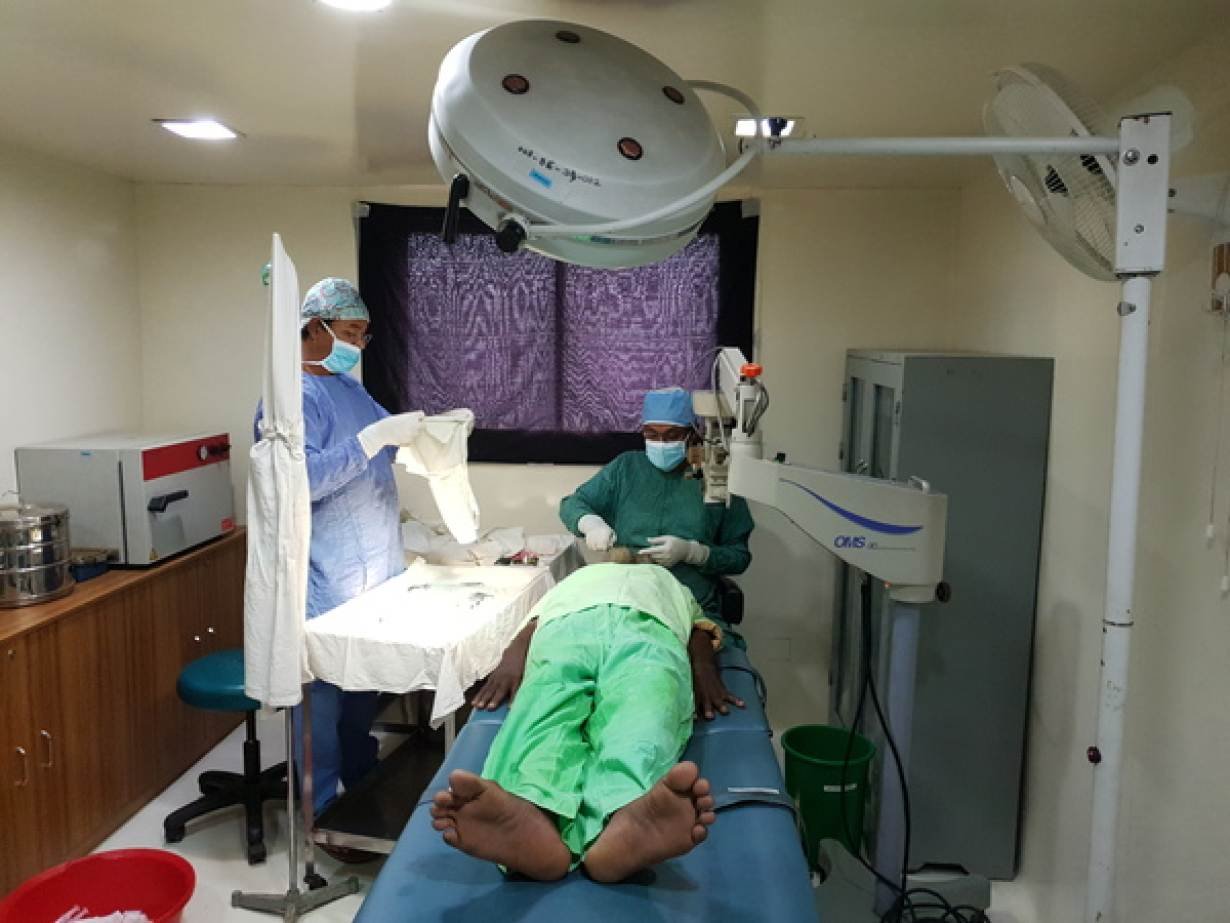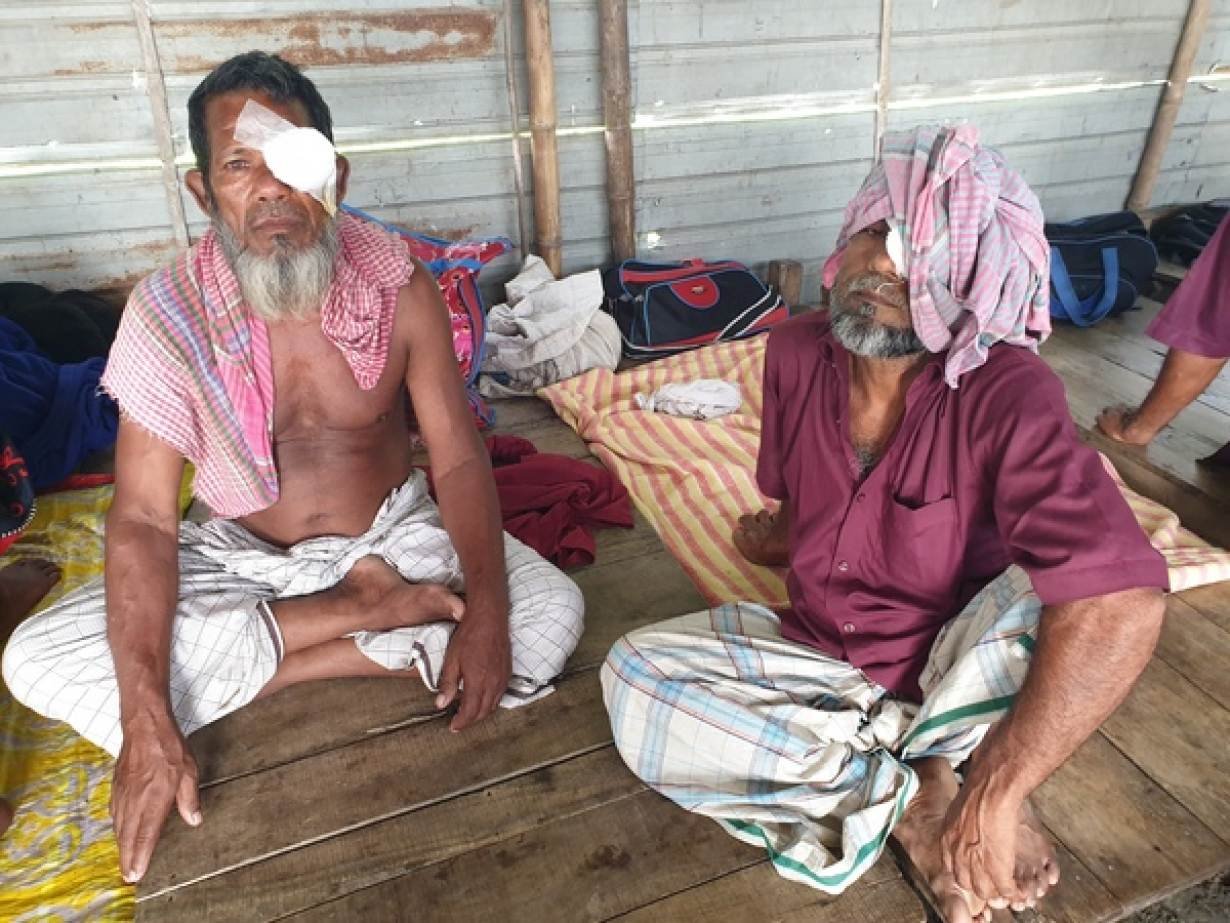By Naimul Karim
DHAKA, May 22 (Thomson Reuters Foundation) — Living on a secluded island in northern Bangladesh, several hours from the nearest hospital, Abdul Jalil believed he was destined to die blind.
That changed earlier this month when the 67-year-old underwent free cataract surgery on a ship moored next to his home.
"I can't wait for my eye bandage to come off," Jalil told the Thomson Reuters Foundation. "It's been so long since I last saw my son properly. I think I have forgotten how he looks."
Jalil lives on an island formed about two decades ago on the Jamuna River from sand and silt deposits.
These islands — known as chars in Bangladesh — are constantly changing shape as they erode and reform, a process that is quickening as a result of more extreme rainfall associated with climate change.
The erosion makes survival difficult for their residents — mostly poor farmers — and discourages building of permanent hospitals, researchers say.
But floating hospital ships, run by a non-governmental organization and equipped with medical facilities and doctors, now provide free treatment in the chars — a system that might be a model for other nations hit by worsening climate threats.
Without the ship, the char's residents must hire a boat and endure a day-long journey to the nearest town hospital, said Kazi Golam Rasul, head of health at Friendship, the NGO.
"They have to spend a lot of time and money to arrange a simple doctor's visit. It discourages them. That's why many residents visit hospitals only when the disease or pain becomes really bad. That is very dangerous," said Rasul.
The NGO currently runs two ships and is in the process of building five more floating hospitals with the help of the King Abdullah Foundation, an organization started by the former Saudi monarch.
 Doctors conduct a cataract surgery inside a floating hospital in Northern Bangladesh, May 3, 2019.
Doctors conduct a cataract surgery inside a floating hospital in Northern Bangladesh, May 3, 2019.
Doctors conduct a cataract surgery inside a floating hospital in Northern Bangladesh, May 3, 2019.
After five years, the new ships will be handed over to the Bangladesh government, which believes Friendship's method of reaching people in remote areas needs to expand.
"This is a viable strategy to get to people who are hard to reach and have no access to medical services," said Nawsher Ahmed Sikder, a civil servant from the Ministry of Finance.
'Life and Death'
Low-lying Bangladesh is extremely vulnerable to climate change and researchers say people living on the chars, far away from the mainland, are at the forefront of experiencing climate impacts, from flooding and storms to worsening erosion.
According to government records, at least 466 families living on chars in Gaibandha in northern Bangladesh lost their homes due to river erosion last year and 67 were forced to move.
In all, about 10 million people live on chars in Bangladesh according to the National Char Alliance, an advocacy group.
Read More: This Bangladeshi Doctor Is Using Plastic Bottles to Save Children's Lives
"It's a matter of life and death. A farmer invests all his money in a land so that he can get crops. Climate change takes that away from him. Everything he has saved goes away in a second," said Runa Khan, who founded Friendship in 2002.
In the last two decades, she said, her organization has noticed diseases occurring outside the seasons they were once restricted to.
To tackle these issues, Khan developed a three-tier system that, as well as bringing patients to the ships, sends medical teams to the chars for check-ups and trains women from the islands to spread awareness and prescribe medicines.
"We realized that you cannot have a healthcare system which is the same in the cities and these unreachable areas. You have to change the system with the available resources and socio-economic capability of the people," said Khan.
It is a model that has been lauded both by the government and climate change experts.
"The concept and practice of providing health facilities to remote communities through a hospital ship was a welcome development," said climate scientist Saleemul Huq, who also praised the plan for the government to take over the project.
Simple Operations
It has been almost two decades since Khan managed to convert a first donated oil tanker into a full-fledged floating hospital, but she recalls how almost everyone around her initially thought the idea would fail.
"Everywhere I went, people said this was impossible. I was told to build a normal hospital in the nearest town. But I had seen the poverty in the chars and I knew that that wouldn't help them," said Khan.
 Residents of a shifting island in Northern Bangladesh wait for a doctor in a tin shed after undergoing cataract surgery on a floating hospital on May 3, 2019.
Residents of a shifting island in Northern Bangladesh wait for a doctor in a tin shed after undergoing cataract surgery on a floating hospital on May 3, 2019.
Residents of a shifting island in Northern Bangladesh wait for a doctor in a tin shed after undergoing cataract surgery on a floating hospital on May 3, 2019.
Today, the floating hospitals dock at the better known, permanent chars and stay for two months before moving on to another island.
The ships are equipped to provide services ranging from primary check-ups to complicated surgeries that address burn wounds or disfigurement.
They can also test for cervical cancer, the second most common type of cancer in the country, according to the United Nations.
The organization also brings medical teams from Europe and the leading hospitals in Bangladesh to perform surgeries.
Nonetheless, Friendship says a lack of awareness in the chars hampers what they can do.
Read More: India Is Planning to Give Free Health Care to 500,000,000 People
"We have seen old men socially sidelined because of cataracts. We have seen children get isolated because of fractures or burn wounds. What many of them don't know is that there are simple operations that can help them," said Rasul.
When 8-year-old Shariful fell off a tree, fracturing a hand, his father was initially reluctant to send him to the ship, fearing doctors might amputate the arm.
It took days to persuade him, but now Shaju Mia is a convert.
"I am glad I came here," he said of the ship. "I realized that whatever the doctors were saying made sense. My son had the surgery and thankfully, he is a lot better today."
(Reporting by Naimul Karim @Naimonthefield; editing by Laurie Goering and Claire Cozens. Please credit the Thomson Reuters Foundation, the charitable arm of Thomson Reuters, that covers humanitarian news, women's and LGBT+ rights, human trafficking, property rights, and climate change. Visit http://news.trust.org)